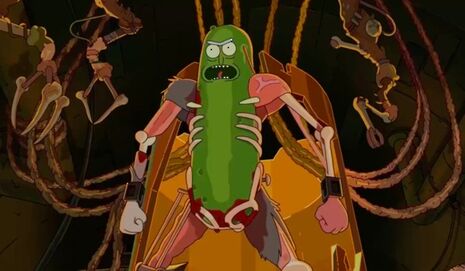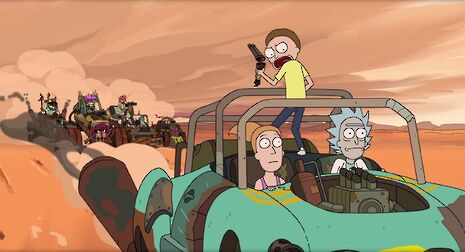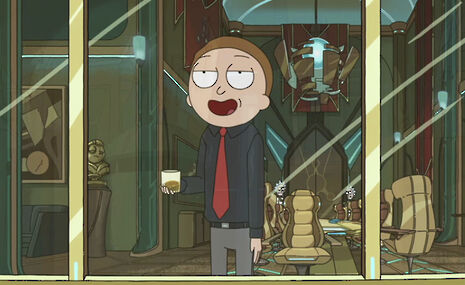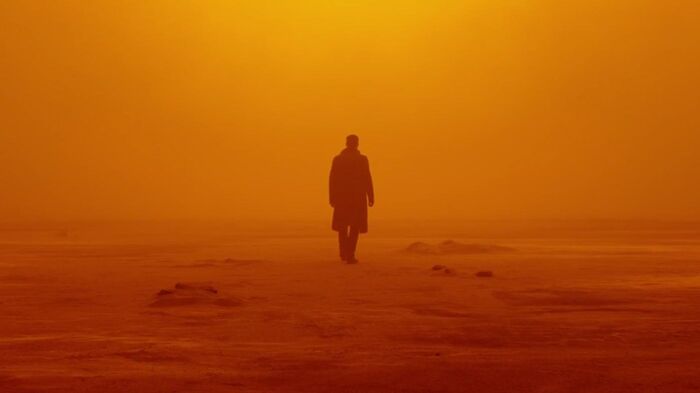Rick & Morty review: slowly getting schwifty
After a slow start, Daniel Gayne believes the third season of the animated series showed sparks of genius before a confused finale

Rick & Morty seems to be the year’s surprise hot topic. From the McDonald’s Szechuan sauce debacle to Rule 34, the show’s multiverse-spanning dose of existential dread, which chronicles the misadventures of nihilistic scientist Rick Sanchez and his pathetic grandson Morty Smith, seems to have done something to capture the zeitgeist.
“These would be worthy themes if it was not for the show’s own commitment to nihilism”
But while series three has been met with acclaim, in my mind the show has soured somewhat. After a brilliant season opener, culminating with a manic rant in which Rick promises the show’s darkest season to date, we have to settle for a series of mediocre episodes and a messy arc, salvaged only by a few gems.
Nevertheless, the twisted comedy and absurd inter-dimensional plots are still there, but the way the whole season tries to contort itself into some kind of larger narrative is neither convincing nor interesting. The four episodes following the opener are alright stand-alone episodes, and they all deal in some way with the kids coming to terms with their parents’ divorce, illusions about heroes being shattered, and the development of Rick and Jerry’s relationship. These would be worthy themes if it was not for the show’s own commitment to nihilism, which over the first two seasons has worn down its characters to husks incapable of meaningful interaction with them.
‘Vindicators 3: Return of Worldender’ saw Rick set up Saw-like puzzles for a group of intergalactic superheroes to expose their incompetency and narcissism. But Morty accepts the moral of the story – that the vanity of supposed ‘heroes’ is nothing to aspire to – almost immediately and so the whole plot loses any tension.
Fortuitously, things take a better turn in the second half of the season. This is chiefly because the show stops trying to force unconvincing character development and focuses on self-contained, ambitious storytelling.

In ‘Rest and Ricklaxation’, Rick and Morty have the toxic parts of their personalities removed by an alien spa. It is amusing to watch, perhaps for the first time, the characters flipped, with Rick as considerate and ethical and Morty as driven and obnoxious. It is also one of the most thematically interesting episodes of a show which often trades in vulgar nihilism, exposing the relativity of all notions of personal improvement. One can imagine the episode as source material for pop philosophy discussions on the nature of the self.
“This prompts a fight which triggers a descent into hilarious amnesiac farce”
‘The Ricklantis Mixup’ showcased the writers’ mastery of storytelling. In the space of only 22 minutes and with various iterations of the same two characters, we are gifted an amazing feat of world-building. It trades heavily in movie tropes and direct imitation, but manages to weave three storylines from disparate genres into a coherent and compelling plot better than many feature films. It uses the show’s pretence of access to the multiverse to explore the many sides of Rick and Morty, rather than being bogged down in the necessities of conventional, linear, multi-season character arcs.
‘Morty’s Mindblowers’ is much more of an easy watch, composed of little vignettes of adventures which Rick has removed from Morty’s memory. It is another brilliant expression of Rick’s callousness as a character – exposing his grandson to situations so traumatic they have to be wiped from his memory – but also his insecurity, as Morty discovers that Rick has been removing any memory that made him look foolish. This prompts a fight which triggers a descent into hilarious amnesiac farce.

These three episodes are genuinely great bits of TV, and some of the best of Rick & Morty to date. They are followed by another strong episode, featuring an interesting and much needed bit of character development for Beth, as she discovers just how similar she is to Rick and is provided with a Sophie’s choice of whether to leave her family to gallivant around the universe, replaced by a Rick-made clone, or stick it out with the kids.
Given the increase in quality over the course of the season, one could have justifiably expected a finale to top off this ascent. Sadly not. ‘The Rickchurian Candidate’ was all sterile action with too few laugh-out-loud moments. In this sense it was similar to the Pickle Rick episode, but rather than leaning on pure absurdity, the running gag was essentially the satirising of presidential insecurity and narcissism, something which is difficult to pull off today without being outshone by the daily news. Besides being a pretty mediocre episode, the quality of finality itself was poorly executed. The season was supposed to be 14 episodes long, with a completely different finale, and it shows.
As Beth struggles with the question of whether she is a clone (the truth of which is never established), she comes to revive her relationship with Jerry and the family decide to join them in essentially rejecting Rick. There is a narrative arc here. The resolution is a pay-off to an essentially patriarchal struggle between Rick and Gerry which was established in episode one when Beth left Gerry, and which has been loosely the theme of the season. But the theme is dealt with only infrequently in the intervening episodes and so the choice of almost all the main characters to abandon seem somewhat random. None more so than Morty, who goes from playful camaraderie with Rick, the product of seasons of development towards a nihilistic world-weariness, to “just a happy little 14 year old” within a matter of minutes.
Rick & Morty has had a fair share of mediocre episodes in its time, but given the story-telling talent of show-runner Dan Harmon, the finale is truly an aberration. Given that the reason Harmon gave for the delay in producing series three was his perfectionism, it is hard to see how he could have been satisfied with the turn the show has taken
 News / Colleges charge different rents for the same Castle Street accommodation2 March 2026
News / Colleges charge different rents for the same Castle Street accommodation2 March 2026 News / News in Brief: waterworks, wine woes, and workplace wins 1 March 2026
News / News in Brief: waterworks, wine woes, and workplace wins 1 March 2026 News / Climate activists protest for ‘ethical careers policy’1 March 2026
News / Climate activists protest for ‘ethical careers policy’1 March 2026 News / Angela Merkel among Cambridge honorary degree nominees27 February 2026
News / Angela Merkel among Cambridge honorary degree nominees27 February 2026 News / Private school teacher who lied about Cambridge degree barred from teaching27 February 2026
News / Private school teacher who lied about Cambridge degree barred from teaching27 February 2026









